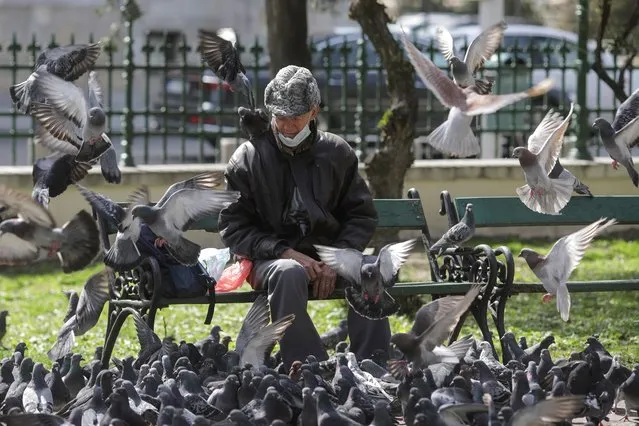
A man rests on bench after feeding pigeons in Bucharest, Romania, March 27, 2020. (Photo by Octav Ganea/Inquam Photos via Ruuters)
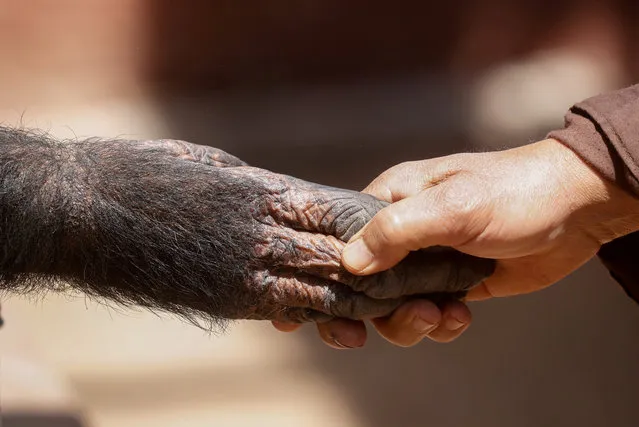
Giza Zoo keeper, Mohamed Aly touches the hand of a chimpanzee called “Jolia” as she reaches through the cage bars, after the zoo was closed to help prevent the spread of coronavirus disease (COVID-19), on the outskirts of Cairo, Egypt on April 2, 2020. (Photo by Amr Abdallah Dalsh/Reuters)
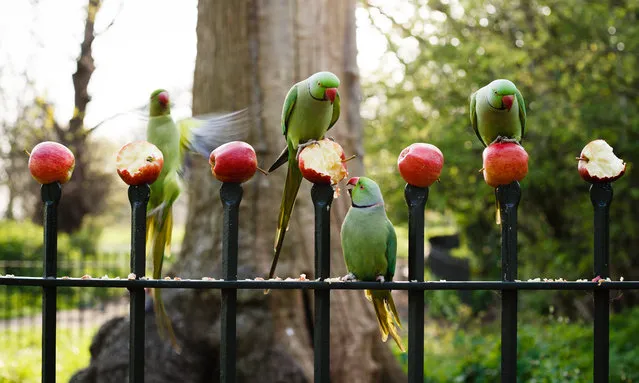
Parakeets eat apples fixed to the points of a fence in Kensington Gardens in London, England, on April 9, 2020. As Britain begins what is forecast to be a warm Easter holiday weekend, Foreign Secretary Dominic Raab today stressed the importance of not giving up 'social distancing' measures at a time when hopeful signs are beginning to show in the data for covid-19 coronavirus transmissions and hospitalisations. Raab, who is currently deputising for hospitalised Prime Minister Boris Johnson (who is now out of intensive care as he continues his recovery from the virus), announced today that a decision on next steps for the UK's coronavirus lockdown would not come before the end of next week. An extension of at least several more weeks is, however, widely expected. Across the UK meanwhile a total of 65,077 people have now tested positive for the novel coronavirus, with 7,978 having died. (Photo by David Cliff/NurPhoto via Getty Images)
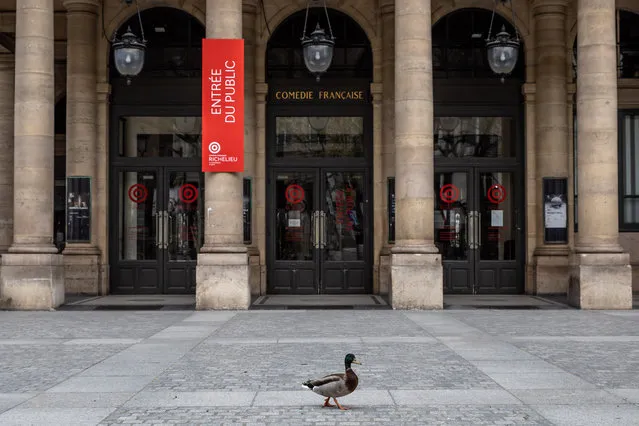
A duck is seen in a street in Paris, France, April 6, 2020. France has imposed a two-week nationwide lockdown on March 17, and it was extended to April 15. Under a lockdown, people have been forced to stay at home, except for trips for purposes of work, health needs or shopping of necessities. (Photo by Xinhua News Agency/Rex Features/Shutterstock)
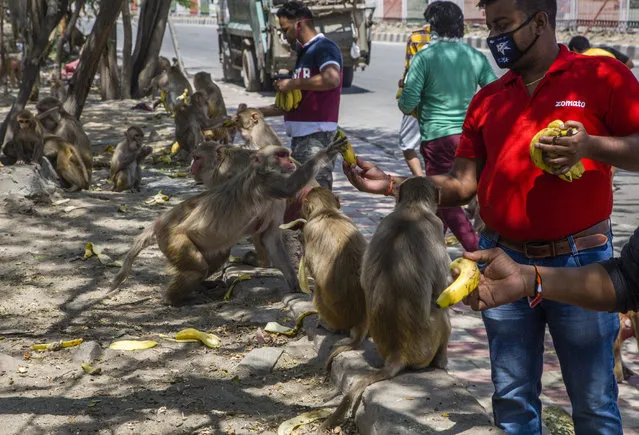
Men give bananas to monkeys gathered on the side of the road as India remains under an unprecedented lockdown over the highly contagious coronavirus (COVID-19) on April 08, 2020 in New Delhi, India. Wild animals, including monkeys, are roaming human settlements in India as people are staying indoors due to the 21-day lockdown. With India's 1.3 billion population and tens of millions of cars off the roads, wildlife is moving towards areas inhabited by humans. Wild animals in many countries have been seen roaming streets. A study says some 60 percent of the new diseases found around the globe every year are zoonotic, meaning they originate in animals and are passed on to humans. COVID-19 is a zoonotic disease that is suspected to have come from the wet markets of Wuhan, China. (Photo by Yawar Nazir/Getty Images)
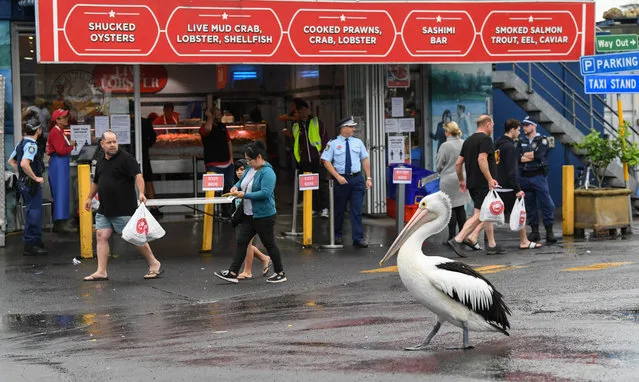
Pelicans watch customers as they enter fish shops with police officers ensuring safe behaviour at Sydney Fish Market on April 10, 2020 in Sydney, Australia. With strict social distancing rules in place due to COVID-19, the Sydney Fish Market has implemented new measures for Easter weekend including additional crowd control to limit how many people can be on site at one time will be in place. Public gatherings are now limited to two people, while Australians are being urged to stay home unless absolutely necessary in a bid to reduce the spread of COVID-19. New South Wales and Victoria have also enacted additional lockdown measures to allow police the power to fine people who breach the two-person outdoor gathering limit or leave their homes without a reasonable excuse, such as grocery shopping, medical purposes, for exercise, or to go to work. (Photo by James D. Morgan/Getty Images)
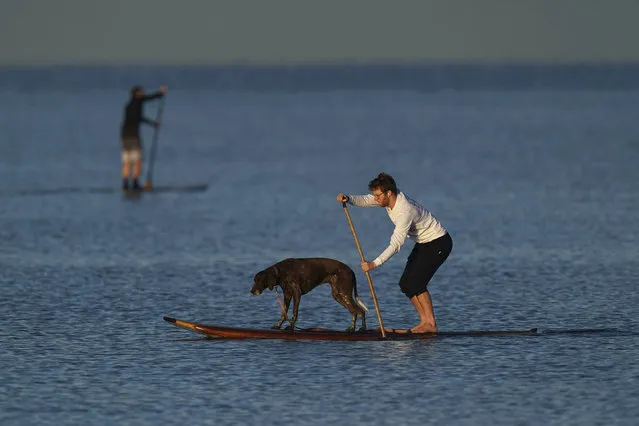
A paddle boarder is seen with his dog at Mordialloc beach, Thursday, April 9, 2020. Victoria's harsher social distancing laws started with a ban on all but the most basic outdoor activities. (Photo by Michael Dodge/AAP Image)
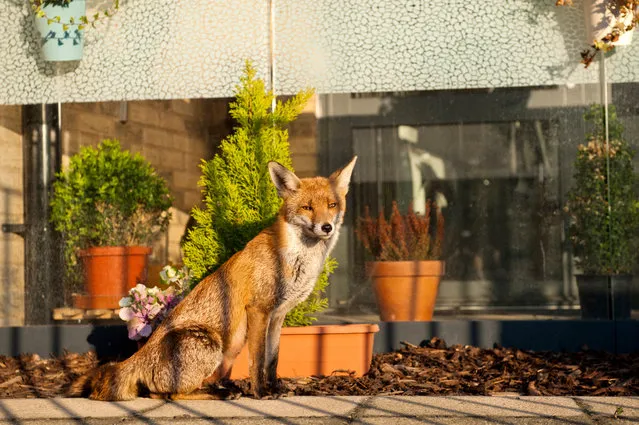
Urban foxes are becoming more brazen during the coronavirus pandemic. This one lives near Asda on Old Kent Road in south London, England on April, 2020. (Photo by Jill Mead/The Guardian)
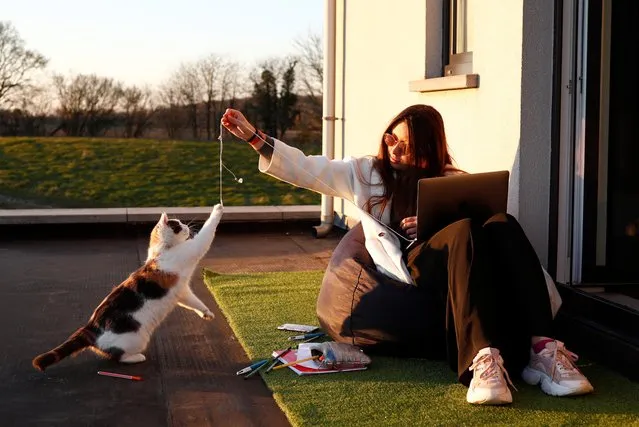
Lea, 19, plays with her cat as she studies in her house, during the lockdown imposed by the Belgian government to slow down the coronavirus disease (COVID-19) spread, in Moorsel, Belgium March 31, 2020. (Photo by Francois Lenoir/Reuters)
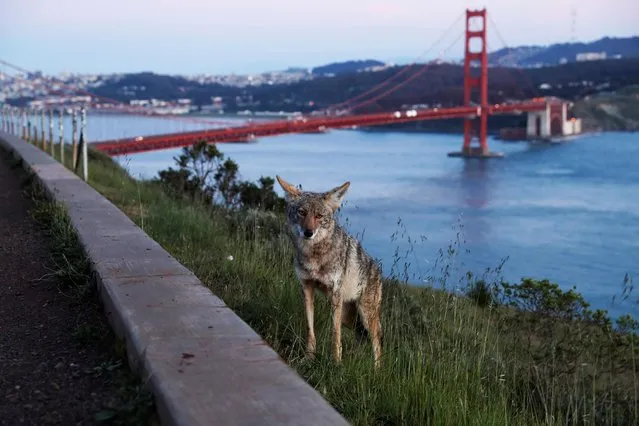
A coyote stands by the roadside as the spread of coronavirus disease (COVID-19) continues, at Golden Gate Bridge View Vista Point across from San Francisco, California, U.S., April 7, 2020. (Photo by Shannon Stapleton/Reuters)
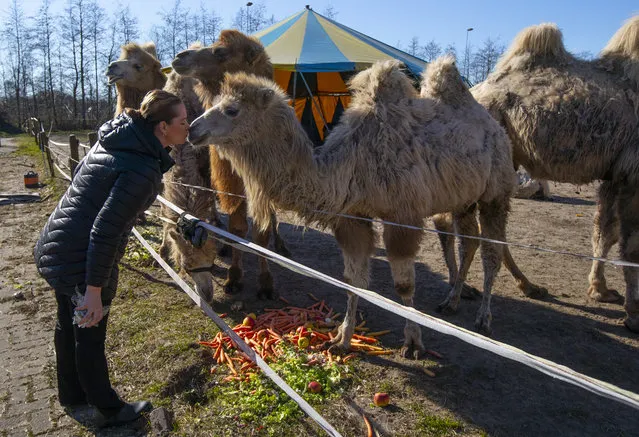
Sarina Renz kisses one of the eight Siberian Steppe camels, of the stranded Renz Circus in Drachten, northern Netherlands, Tuesday, March 31, 2020. The circus fleet of blue, red and yellow trucks have had a fresh lick of paint over the winter. But now, as coronavirus measures shut down the entertainment industry across Europe, they have no place to go. “It's catastrophic for everybody”, said Sarina Renz, of the German family circus that has been in existence since 1842. (Photo by Peter Dejong/AP Photo)
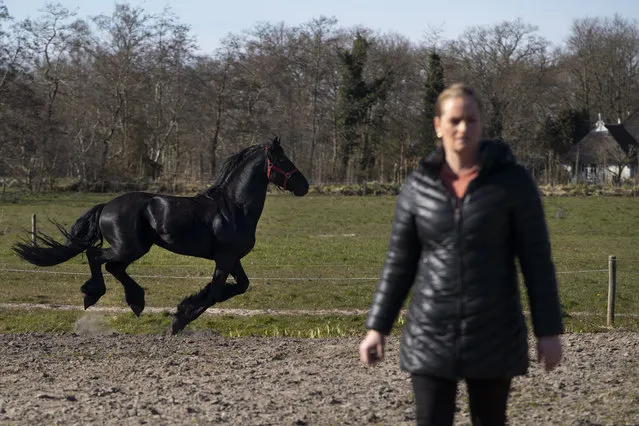
A Friesian stallion runs past Sarina Renz during feeding time for the stranded animals of the Renz Circus in Drachten, northern Netherlands, Tuesday, March 31, 2020. (Photo by Peter Dejong/AP Photo)
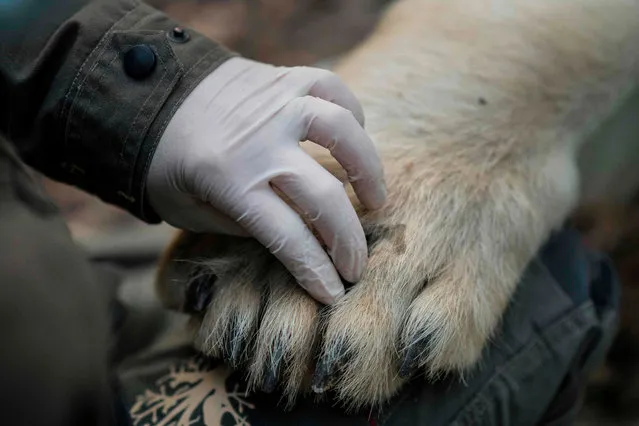
Vetenarians from the Mulhouse Zoological Park in eastern France, examin the paws and prepare a young sedated polar bear called Nanuq, before being transfered to the CERZA zoo, near Lisieu in Normandy and later onto a zoo in the La Flèche in the Loire Valley region on April 9, 2020. Nanuq, who weighs just over 200 kilograms and was born at the end of 2016 at the Mulhouse zoo, left her birthplace on April 9, 2020, to join the CERZA zoo, which volunteered to welcome her while her new enclosure is made ready in La Flèche, where work has been delayed due to the lockdown across France because of th COVID-19, the disease caused by the novel coronavirus. (Photo by Sebastien Bozon/AFP Photo)
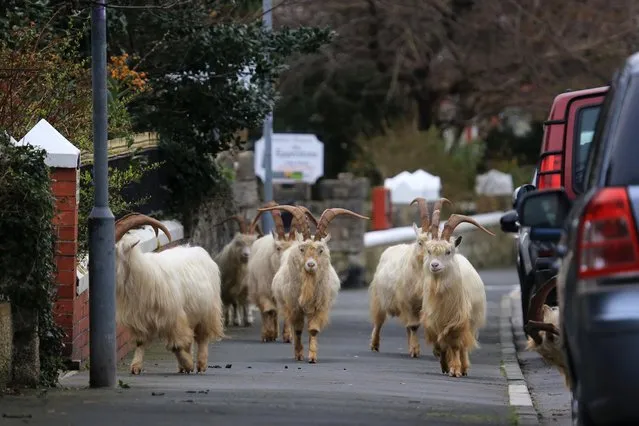
The royal goats that live on the Gt Orme in Llandudno, Wales have come further into town away from the mountain on March 29, 2020, due to the lack of people being out, destroying everything in their path that they can eat. (Photo by Rob Formstone/The Time)
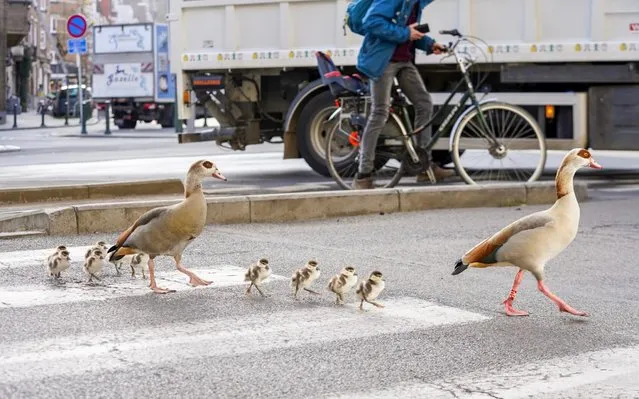
Ducks and ducklings walking in the street of Brussels during coronavirus lockdown, Belgium on April 3, 2020. (Photo by Isopix/Rex Features/Shutterstock)
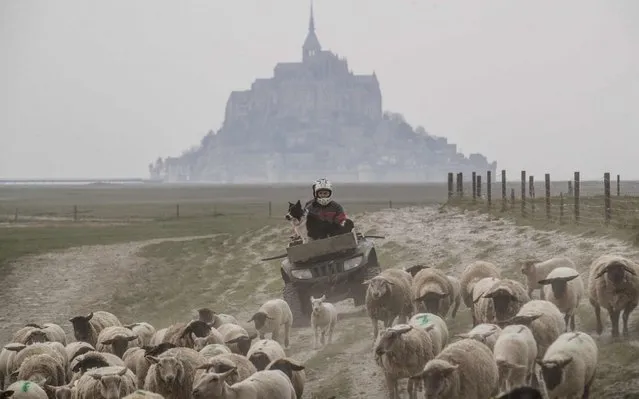
A farmer drives a vehicle in order to push the sheep back to their shelter near the Mont-Saint-Michel, northwestern France on March 28, 2020 during a lockdown in France aimed at curbing the spread of the COVID-19 (novel coronavirus). The lamb farming sector, like other agricultural sectors, has also been affected by the COVID-19 pandemic. (Photo by Sameer Al-Doumy/AFP Photo)
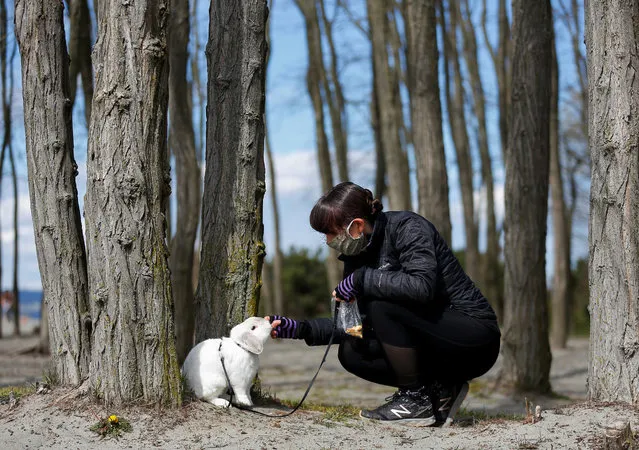
Wearing a mask for the first time in public, Carrie Eaton feeds rabbit Walter while they take a short walk at Golden Gardens Park the day after the CDC recommended people wear non-medical face masks in public during the coronavirus disease (COVID-19) outbreak in Seattle, Washington, U.S. April 4, 2020. (Photo by Lindsey Wasson/Reuters)
12 Apr 2020 00:05:00,
post received
0 comments
